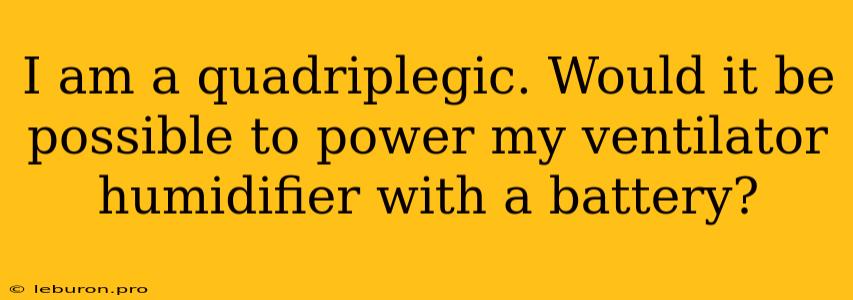Living with quadriplegia presents unique challenges, and maintaining independence with essential medical equipment like ventilators is paramount. One common concern for quadriplegics reliant on ventilators is ensuring a reliable power source for the humidifier. The need for a portable solution, particularly in situations where access to mains electricity is limited, arises frequently. This article delves into the feasibility of powering a ventilator humidifier with a battery, exploring the technical aspects, safety considerations, and available options.
The Importance of Humidification for Ventilator Users
Ventilators, crucial for individuals with respiratory difficulties, require a humidifier to prevent the drying out of the airways. This is particularly important for quadriplegics who may have weakened respiratory muscles and are more susceptible to complications like mucus buildup and infections. A well-functioning humidifier ensures proper airflow, maintains optimal lung health, and improves the overall quality of life.
Understanding the Power Requirements of Ventilator Humidifiers
Ventilator humidifiers come in various designs, each with its own power consumption. Understanding the power requirements of your specific model is crucial when considering battery solutions. Factors to consider include:
- Voltage: Most humidifiers operate on standard household voltage (110V or 220V).
- Wattage: The wattage indicates the amount of power the humidifier draws.
- Current: This is the rate of electrical flow, and it can be calculated by dividing the wattage by the voltage.
Battery Options for Ventilator Humidifier Power
Several battery options can potentially power a ventilator humidifier. The best choice depends on factors like the humidifier's power requirements, portability needs, and user preferences.
1. Portable Power Stations
Portable power stations, often referred to as "power banks," are gaining popularity as backup power solutions. These devices can store significant amounts of energy and offer multiple AC outlets, making them suitable for powering various medical devices, including ventilators and their humidifiers.
Pros:
- High capacity: Many portable power stations can provide enough power for extended use.
- Multiple outlets: Offer AC outlets for other devices.
- Compact and portable: Easy to transport.
Cons:
- Weight and size: Some models can be bulky and heavy.
- Limited recharge cycles: Batteries have a finite number of charge cycles.
- Cost: Higher initial investment compared to other options.
2. Lead-Acid Batteries
Lead-acid batteries are commonly used in car batteries and are known for their high capacity and affordability. However, their weight and size may make them less suitable for everyday use as portable power sources for a ventilator humidifier.
Pros:
- High capacity: Can provide a considerable amount of power.
- Cost-effective: Relatively inexpensive.
Cons:
- Heavy and bulky: Difficult to carry around.
- Limited lifespan: Requires maintenance and eventual replacement.
- Potential for spills: Lead-acid batteries contain corrosive acid.
3. Lithium-Ion Batteries
Lithium-ion batteries are becoming increasingly popular due to their high energy density, lighter weight, and longer lifespans. They are commonly used in laptops, smartphones, and other electronic devices. However, some models might not provide sufficient power for a ventilator humidifier, and it is crucial to ensure compatibility.
Pros:
- Lightweight and compact: Easy to transport.
- Long lifespan: Can withstand numerous charge cycles.
- High energy density: Can store more power in a smaller space.
Cons:
- Potential for overheating: Can overheat during charging or discharge, particularly in extreme temperatures.
- Cost: More expensive than lead-acid batteries.
Safety Considerations when Using Batteries to Power a Ventilator Humidifier
Using batteries to power medical devices requires utmost care and attention to safety. Here are some vital considerations:
- Manufacturer's instructions: Always refer to the manufacturer's guidelines for your specific ventilator and humidifier model. Some manufacturers may explicitly warn against using battery power.
- Voltage compatibility: Ensure the battery's voltage output matches the humidifier's voltage requirement. Using an incompatible battery can damage the humidifier and pose safety hazards.
- Battery safety: Choose reputable battery brands and models designed for medical applications. Check for certifications and safety features such as short-circuit protection.
- Regular maintenance: Batteries require regular maintenance, such as charging, monitoring, and replacement. Follow the manufacturer's recommended practices.
- Fire hazards: Always store and use batteries safely, especially in locations with flammable materials.
- Professional guidance: Consult with your medical team and respiratory therapist for advice and recommendations.
Conclusion
While using a battery to power a ventilator humidifier for quadriplegics can offer increased portability and independence, it requires careful consideration of the specific needs and safety precautions. The best option depends on individual circumstances, humidifier power requirements, and user preferences. It is essential to consult with healthcare professionals and the manufacturer's guidelines to ensure safe and reliable operation. By carefully selecting the appropriate battery solution and prioritizing safety, quadriplegics can maintain their independence and well-being while relying on their essential medical equipment. Remember to prioritize safety and consult with medical professionals for guidance.
